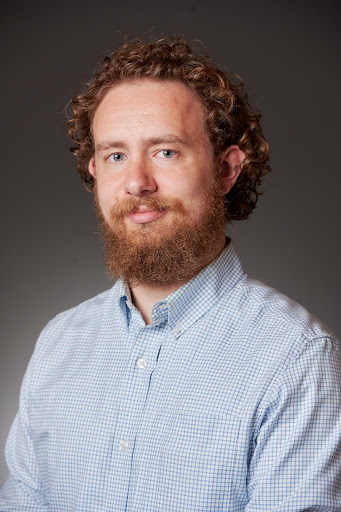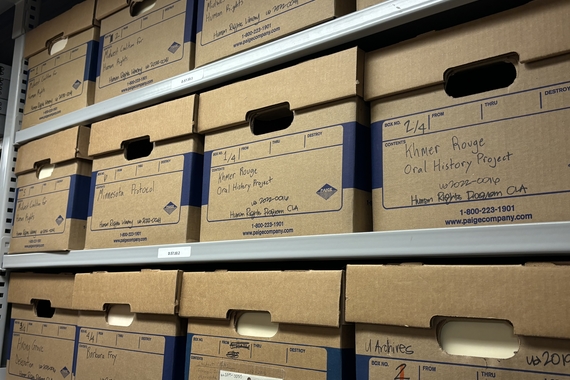Migration and the Future of US-Asia Relationships
The Master of Human Rights Degree Program strongly believes in the importance of integrating professional experience with academic knowledge in the field of human rights, making internships one of the central aspects of the program. Many students, despite challenges posed by the spread of COVID-19 and challenges related to working in the field defending human rights, succeeded in doing amazing work with their host organizations. In this Q&A series, we interview our students to learn more about their experiences. In the fifth Q&A of the series, we are joined by Paul W. Sullivan, a second-year Master of Human Rights (MHR) student who internet with the East-West Center (EWC)’s Washington, D.C. office.
Human Rights Program (HRP): Can you tell us more about your educational background, specifically at the University of Minnesota (your program and your area of concentration), and your professional experience? How did both contribute to your decision in choosing this particular internship and the host organization?

Paul W. Sullivan (PS): Within my MHR degree, I have a self-designed concentration, which is Migration & Transpacific Studies. Essentially what this means is that I focus on the movement of Asian-origin populations across and within the Pacific to the Americas, and the United States in particular. Previous to beginning my MHR degree, I worked for eighteen months doing employment-based immigration work at Nilan Johnson Lewis PA (previously Myers Thompson Medeiros PA). However, my undergraduate major (a BA in Asian Studies with a China Studies concentration) and my time serving in a teaching fellowship at East China Normal University in Shanghai were more influential on my decision to intern with East-West Center (EWC).
Human Rights Program (HRP): Please describe your summer internship, the host organization, your role in that organization, and the projects you worked on?
(PS): My summer internship was with the East-West Center (EWC)’s Washington, D.C. office. EWC is an educational organization founded by Congressional mandate in 1960, and its goal is to promote better relations and understanding among the people and nations of the United States, Asia, and the Pacific through cooperative study, research, and dialogue. Specifically, I participated in EWC’s Young Professionals Program (YPP). In this role, I was mostly responsible for generating content for EWC’s in-house publication Asia Matters for America, as well as lectures put on by various think tanks. Additionally, I began working on research on the role of immigration in international relations between the US and states in the Indo-Pacific.
(HRP): Doing your internship during Covid-19, and working for a new organization can be very challenging. What were the main challenges you faced during your internship on both a personal and a professional level? And how did you overcome them?
(PS): On a personal level, I will admit that maintaining focus and direction in a remote environment was very challenging to me during this internship. I have to give credit to EWC’s YPP supervisors at the time – despite the logistical challenges of the YPP program being online for the first time ever, they not only found ways to keep us on track and help us get what we needed out of the internship, but they revamped and expanded aspects of the pitching and writing process for Asia Matters for America.
(HRP): You have explored the US-Asia relationship in both an academic context at the university and in a professional context during your internship. Can you give us your insights from both experiences?
(PS): The biggest difference between the two was the atmosphere. While an emphasis on national security exists to a degree in both the academic and professional realms of Asian Studies, my experience with academia was more open to a full-throated criticism of US imperialism in the Indo-Pacific. While professional contexts seem to be broadly aware of these criticisms, the sort of people that I encountered in this internship were far more likely to frame Asian Studies through a national security lens, which I found mitigated room for structural criticisms of US behaviors.
(HRP): Given the Biden administration’s shift away from the Middle East towards Asia, and its proclaimed human rights-centered approach in US foreign policy, what are your recommendations for the current administration to reform the US-Asia relationship through prioritizing human rights in this relationship?
(PS): The best advice I can give to the Biden administration, as far as pursuing a human rights-centered approach to foreign policy is concerned, is to start by reframing our national discourse on Asia from one of potential national security threats to genuine cooperation. Too often our foreign policy apparatus is more focused on learning about states in Asia for the purpose of subjugating them to US security interests and US capital, harming ordinary people on both sides of the Pacific in the process. More often than not, this is framed as necessary against the backdrop of a rising China, which threatens US supremacy in the Indo-Pacific dating back to the turn of the 20th century. For the Biden administration to prioritize human rights treaties in the Indo-Pacific, it needs to have less confrontational conversations with China, demilitarize the region (especially the many islands occupied by the US military in the Pacific), and promote fair trade (as opposed to free trade) with states across the region. Lastly, the Biden administration must recognize the negative human rights impact its past and current policies have had across the Indo-Pacific, from the Vietnam War to CIA involvement in the Indonesian Genocide, and begin to hold its allies in the region to the same high level of human rights scrutiny as it does its rivals.


